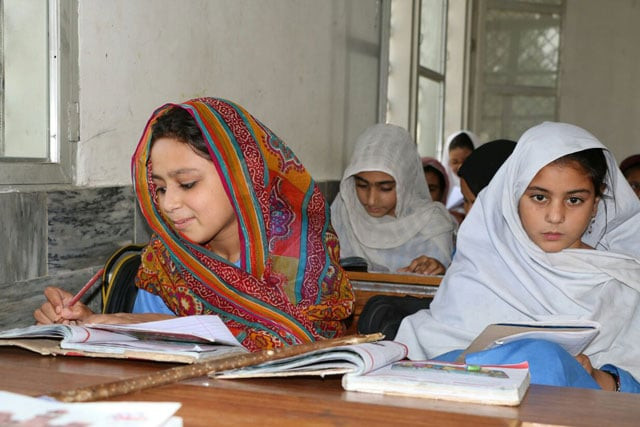A world of tomorrow: Make classrooms more creative, say experts
Panellists suggest making education more inclusive

PHOTO: EXPRESS
They were speaking at the inauguration of “A World of Tomorrow: Seeking Enlightenment & Equilibrium in a New Age”, a two-day festival organised by the Beaconhouse at the Pak-China Friendship Centre.
In a panel on “Setting directions for a world of tomorrow”, novelist Kamila Shamsie emphasised that educational institutes need to be viewed as places of creativity, instead of merely as a place which prepares a student for the job market.
However, with the world changing fast, Shamsie was of the view that reading habits were evolving with it.
“The reading culture is changing dramatically, so the writing culture is likely to change too.”
Physicist Dr Pervez Hoodbhoy said that although science had brought tremendous benefits for humankind, the pursuit for modern day living had also resulted in issues such as climate change, pollution and water scarcity.
On one hand, he said, science had helped extend the average life span of a man living in the subcontinent from 35 a century and a half ago, to around 70-72 today. But on the other hand, major powers such as US and China were building ‘killer robots’ outfitted with artificial intelligence which would be able to pick targets on their own and even decide whether to kill it or not.
Such a technology, Hoodbhoy forewarned, would be available in 20 years’ time.
Hoodbhoy also disagreed with Prime Minister’s Adviser on Foreign Affairs Sartaj Aziz that terrorism was the biggest issue Pakistan faced. Instead, the physicist stressed, uncontrolled population growth posed the greatest risk to Pakistan.
“We were two million [people] in 1947 and there are 200 million of us today. If the population continues to grow at the same pace for another 125 years, Pakistan’s population would be equal to that of the world today,” said Hoodbhoy.
He lamented that population planning was not at the top of the government’s agenda.
“The population bomb has started exploding.”
Speaking about the digital future of the country, Pakistan Software Houses Association President and the big bird at Nest I/O tech incubator Jehan Ara said there was no need to be afraid of new technologies.
Despite that, she said there was an ever greater threat to the privacy of individuals on the internet from governments, large technology companies and people with access to large data.
At the end of the plenary, moderator Kasim Kasuri asked the panelists to predict whether the future was going to be more secure and safe.
Shamsie did not believe so, but Hoodbhoy and historian Lesley Hazleton said they had yet to give up.
“As a historian, and as a woman, when I look back at the first century, or 17th or 19th, I say thank god I live in the 21st Century,” said Hazleton.
Speaking to The Express Tribune on the sidelines of the sessions, Hazelton said the motivation for her to write books ‘After the Prophet’ and ‘The First Muslim’ was her curiosity for Prophet Muhammad (pbuh).
“The more I read the more I wanted to know about him,” she said.
Earlier, Adviser to the Prime Minister on Foreign Affairs Sartaj Aziz said dilated on the importance of unravelling and preparing for the world of tomorrow.
Students of the Beaconhouse school also performed a mime and a tableau at the opening ceremony.
The festival features interactive panel discussions, debates, presentations, science corner, concert and food court. The event is expected to conclude today, Sunday.
Published in The Express Tribune, March 12th, 2017.



















COMMENTS
Comments are moderated and generally will be posted if they are on-topic and not abusive.
For more information, please see our Comments FAQ